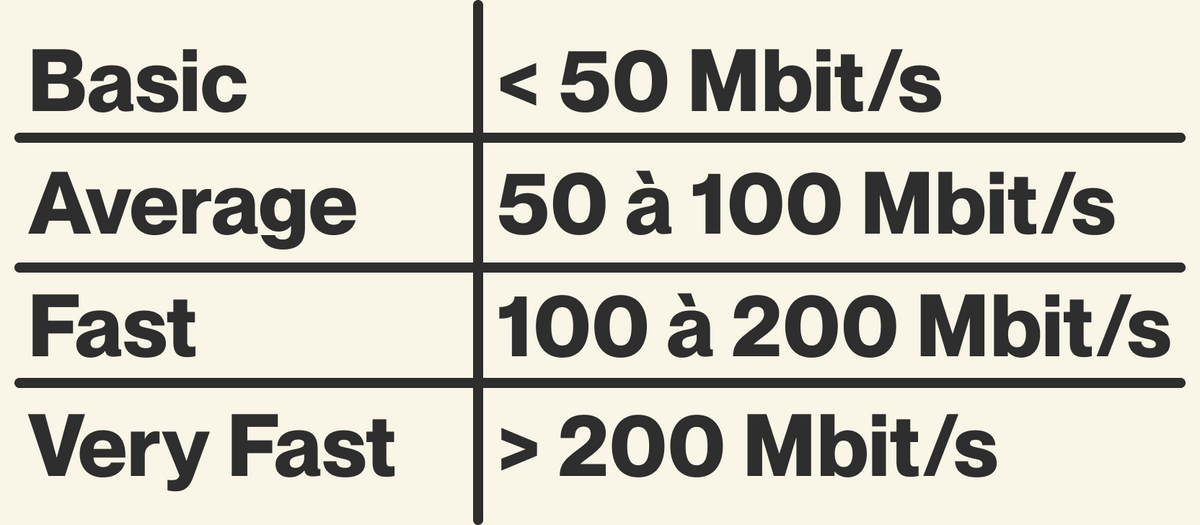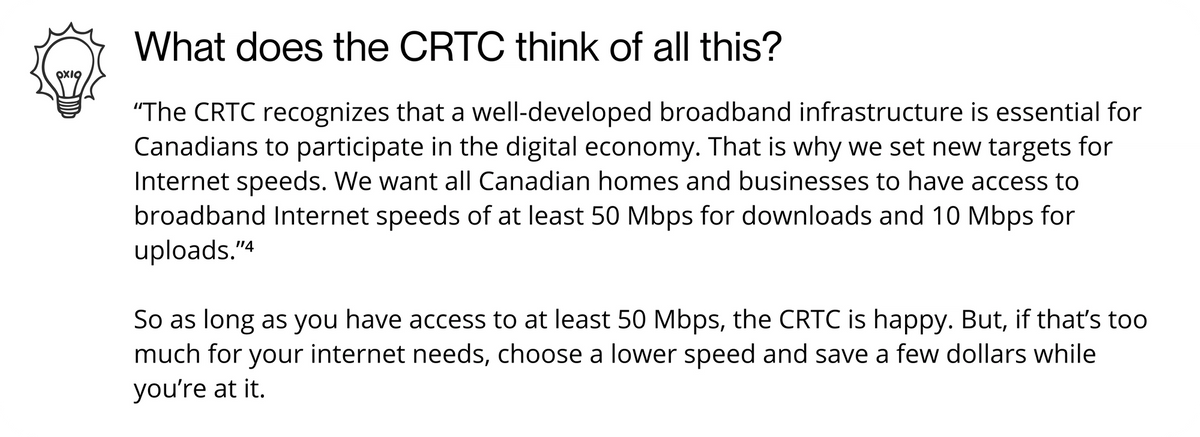
This is not a sneaky attempt to sell you the fastest internet plan. This article is all about clearly and simply explaining who needs which internet speed. That’s it.
We know that not all internet service providers offer exactly the same speeds, so we’ve come up with a few ranges to help.

Three points to remember when choosing an internet speed:
- Download speeds (receiving data from the web) are usually the main factor to look at when making your choice. If you try to do too many things at the same time without enough download speed, you’ll feel your internet slow down.
- Upload speeds (sending data to the web) are usually high enough to cover all your needs and are not a particularly important thing to consider when you make your choice. (There are, like always, a few exceptions to this. You'll see.)
- Whatever the speed of your internet plan, if your router (the device that lets you connect to the internet) is not correctly positioned or if it’s not adapted to the layout of your home, you’ll have speed problems. Make sure everything looks good on that side too! And, if you need a hand, we’re right here.
In this article, we’ll suggest which speed you need according to how you use the internet. Our recommendations are going to be pretty general. So, if you can’t relate to any of the examples we’re using here, we wrote another article that explains how to figure out what internet speed you need. It's pretty in-depth (but also pretty interesting).
We can hook up later.
If you’re not ready to switch just yet, we get it. Good things take time. Stay in the loop on all things oxio with our seductive emails.
If you’re living solo. (< 50 Mbps)
These days, “basic” internet speeds are nothing like the dial-up internet of ten years ago. For starters, dial-up isn’t a thing anymore. (I can still hear the dial tone.) Today’s basic plans are usually fast enough to cover a single person's streaming, music, email, social media, etc. needs. How do we know? Well:
The minimum speed you need to watch Netflix.
Netflix barely needs 5 Mbps for streaming in HD and only needs 15 Mbps to stream its addictive shows in 4K1. So if you spend your time watching your shows while scrolling your feed (not great for the brain, but hey, we all do it2), you'll be just fine with 30 Mbps.
The speed you need to work from home (alone).
If you’re the only one working or taking classes from home, around 30 Mbps will keep things running smoothly. You’ll be able to see everyone's faces, and everyone will be able to see yours, glitch free.
Good enough for two.
Living with someone means sharing almost everything. And your internet is no exception. So, if you can keep it to 3-4 devices using your wifi at the same time (scrolling Facebook on your phone, while streaming Netflix, while playing music on another phone, while chatting on Zoom on your laptop), you’ll be more than comfortable with 50 Mbps.
If you’re average. (50 to 100 Mbps)
Most of us will be just fine with an average speed plan. Fast enough to handle multiple devices at the same time, whether it’s one person streaming 5 different shows on 5 different devices or four or five people all on their own device. Most oxio customers use an average speed plan and, well, so far so good. Think this might be the speed for you? Well:
For families.
Kids these days spend a lot of time watching videos and playing games online. And us adults too for that matter. Our busy online lives mean you might need an internet plan with a speed of around 75 Mbps.
Internet for live sports fans.
Listening to multiple games on multiple sites at the same time doesn’t need as much speed as you might think. (Play smart not fast…eeesh sorry.) For epic game nights, around 50 Mbps should keep everything running smoothly. No awkward fumbles here. (Again, so sorry for the very mediocre sports analogies.)
If you’re a student.
School is all about showing up and today that means showing up online. And with the weird and often double booked realities of school these days, 60 Mbps will be enough to keep your connection from crashing and your classes from buffering.

If you’re a power user. (100 to 200 Mbps)
These speeds are fast and most people will rarely consume 100-200 Mbps. But, if you live with more than 5 people, and y’all spend your time downloading large files, a fast internet speed will help you avoid that laggy feeling if, you know, more than 10 devices are often connected to your internet at the same time. So, if you’ve got a big family or a lot of roommates… Then:
For a full house.
If you’ve got more than a couple people living under your roof and there are usually more than ten devices connected to the internet, you’re going to need around 150 Mbps. Unless you’re okay with everyone's videos streaming like a PowerPoint presentation. (One slide at a time.)
If you download and upload on the regular.
Mathematically speaking, uploading a 10GB video file at 10Mbps takes about two and a half hours. So, if you have to do this a few times a day (professionally or for, you know, whatever), that can really eat up your time. Internet plans with download speeds between 100 and 200 Mbps often come with upload speeds of 15 or 20 Mbps, which will definitely ease your pain (and make downloading those large files much, much faster).
The faster than fast speeds. (>200 Mbps)
If you’re not sure if you need faster than fast internet, you probably don’t need it. People who download and upload a lot of very large files, such as video, know that they need faster speeds. And 200 Mbps or faster will make it all a lot more bearable.

Well, that’s about it.
The number of people you live with, the number of devices connected, and what you do online are all things worth considering when you choose the speed of your internet plan. We know we didn’t go over every possible situation, but we think there’s enough info in here to help you make an informed decision.
We certainly don't want you to not get faster than fast internet (aka high speed) if you really want or need it, but we do think it’s a pretty pricey option if you don’t actually need it.
To sum it all up: if you have more than a few devices and your current speed no longer does the trick, go ahead and treat yo’ self! If you download large games on the regular, that's as good a reason as any to choose a faster speed. But, if you’re willing to wait an extra hour or two (or download large files overnight) you can save more than a few dollars a month by choosing an average speed internet plan.
We’ve been told over and over again that the best internet speed is the fastest. And that’s just not true. It's a straight up lie, even. The best speed is the one that costs you the least while letting you live your best online life.
Article written by Danilo Tubić with the help of Caroline Duperré and Francis Careau. It was adapted by David Purkis. David lives with his boyfriend, works from home, watches too much Netflix and plays too many video games. His internet speed is 60 Mbps and pretty much never lags.







